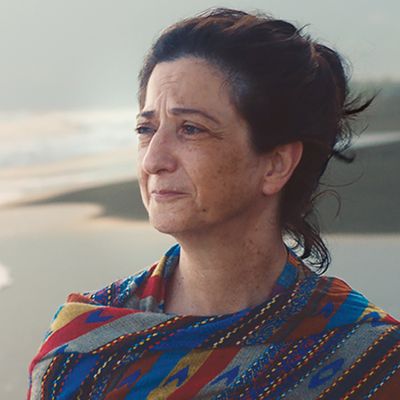
The Guatemala of the grim drama Our Mothers (Nuestras Madres) sits on top of a boneyard, its buildings crumbling into the earth as if to merge with their former, murdered inhabitants. The bones date back to the country’s 36-year civil war and, in particular, the carnage of the early 1980s, when army and paramilitary units escalated the torture, rape, and “extrajudicial” execution of civilians (many of them indigenous Mayans) suspected of aiding left-wing guerrillas. It didn’t take much, evidently, to get the men of a village shot or beaten to death and the women used as sex slaves or — in an especially sick game — made to dance on the ground over their husbands’ bodies. The film is set long after the war, in 2018, when the current government began — better late than never — to hold former soldiers to account; and as the trial is broadcast on radio and TV, a young forensic archaeologist, Ernesto (Armando Espitia), emerges from sundry desolate excavation sites and begins the task of connecting hip bones to thigh bones, etc. In a prologue, he assembles a particular skeleton with great tenderness, setting the skull atop a small cushion as if it had belonged to a king. The image lingers through the movie, a talisman both eerie and exalted.
Clocking in at under 80 minutes, Our Mothers feels a little incomplete, like shards from a larger mosaic, but that somehow fits its subject and protagonist. The 41-year-old director, César Diaz, comes from documentaries and approaches his task like a forensic archaeologist himself, sticking to what he finds in the material world, declining to fill in or embellish. We get no flashbacks — nothing beyond the hard, aged faces of survivors. And bones, of course. One of Ernesto’s tasks is to present boxes of them — post-identification — to families who want to take their loved ones home, decades after the disappearances. When an indigenous woman, Nicolasa (Aurelia Caal), pressures Ernesto to return with her to her village to help dig up her husband’s remains (“I want him to be in a place where I can speak to him,” she says), he demurs. He’s very busy these days. Plus his boss has maintained that most of the women who trudge into the city to testify have come for the government’s newly publicized financial compensation. Yes, he says, many of them look as if they’ve been scorched in hell. But “suffering is not synonymous with truth.”
Thank Heaven that guy isn’t the protagonist, or Our Mothers would be even more depressing. Ever in search of answers, Ernesto — whose own father was a guerrillero who went missing — drives along the misty mountain roads with a sardonic buddy who says things like, “To live in this shitty country you have to be mad or drunk,” before taking another belt. In the jungle, he finds a group of aged wives and mothers much like Nicolasa, with the kinds of stories that keep war-crimes tribunals in business for years. Amid Ernesto’s interviews, the director delivers his one cinematic flourish: He presents each woman (in vibrant indigenous dress) serially in close-up against a planked wall. The faces carry traces of grief and anger, but the women are largely stoic. We stare at them, trying to extrapolate the details of their lives, but they resist us. They turn out to be real survivors of that village, not actors. This forensic archaeologist can only dig so deep. The burial site turns out to be on private land guarded by unsmiling young men who grew up in the village but whose hearts seem to have been hardened at their wealthy employer’s behest.
The most surprising moments in Our Mothers are between Ernesto and his own madre (Emma Dib), who is reluctant to discuss what happened to her at the war’s height. “You ask me some things I’d never say, even under torture,” she says to her son — a formulation that’s odd and telling and suggests there are things buried far down. We’re not supposed to like her much at first, and we don’t. She withholds too much. She’s closed. The actress saves it all up for her final scenes — the first in the courtroom, the next while clinging to her son in semi-darkness. Ernesto has been floating through life, unconnected from his roots. Now, his own past is exhumed. It feels ghastly, and it feels right.
Our Mothers (which won the Caméra d’Or at last year’s Cannes Film Festival and is available to watch on demand beginning May 1) is the sort of movie that gets lost in the U.S. when life is normal. It’s a good one to see when you’re anxious, in pain, hypersensitized, uncertain of the ground beneath you, and thinking — maybe for the first time — that you ought to start digging.
*This article appears in the April 27, 2020, issue of New York Magazine. Subscribe Now!


